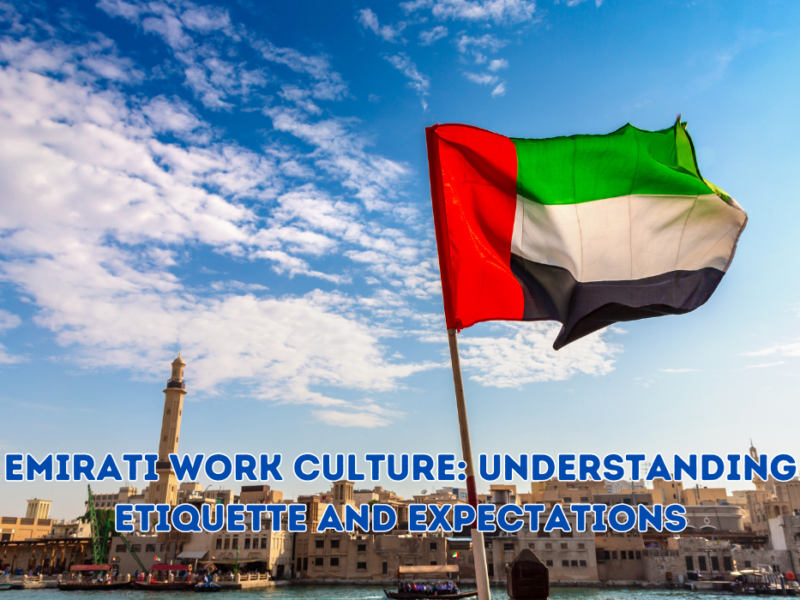Emirati work culture reflects the rich heritage and values of the United Arab Emirates (UAE). As the UAE continues to grow as a global business hub, understanding the nuances of Emirati work culture is essential for successful professional relationships and collaborations.
Introduction to Emirati Work Culture
Emirati culture is deeply rooted in traditions, hospitality, and respect for hierarchy. In the workplace, these cultural values translate into specific expectations and etiquette that shape professional interactions.
Values and Principles in Emirati Work Culture
Hierarchy and Respect
Emirati society values hierarchy, with authority typically centralized in leadership roles. Respect for authority figures, especially elders and senior executives, is paramount.
Teamwork and Collaboration
While hierarchy is important, Emirati work culture also emphasizes teamwork and collaboration. Building strong relationships with colleagues and stakeholders is key to success.
Loyalty and Commitment
Emiratis value loyalty and commitment in professional relationships. Long-term partnerships are highly valued, and trust is built over time through consistent actions and reliability.
Dress Code and Appearance
Traditional Attire vs. Western Attire
Emirati men often wear traditional attire, such as the Kandura, while women may wear Abayas or traditional dress. In more formal business settings, Western attire is also acceptable.
Dress Code Expectations in the Workplace
In the workplace, dressing conservatively and professionally is important. Both men and women are expected to dress modestly, avoiding flashy or revealing clothing.
Communication Style
Politeness and Formality
Emirati communication tends to be polite and formal, with a focus on showing respect and courtesy. Addressing colleagues and clients with titles and using formal language is common practice.
Non-verbal Communication Cues
Non-verbal cues, such as facial expressions and body language, play a significant role in Emirati communication. Maintaining eye contact and using appropriate gestures convey respect and attentiveness.
Respecting Personal Space
Emiratis value personal space and may stand at a comfortable distance during conversations. Respect for personal boundaries demonstrates cultural sensitivity and consideration.
Work Hours and Schedule
Understanding the Concept of “Inshallah Time”
“Inshallah time” reflects the relaxed attitude towards punctuality in Emirati culture. While schedules are important, there is a flexibility and acceptance of delays due to unforeseen circumstances.
Flexibility in Work Hours
Emirati work culture often allows for flexibility in work hours, especially during Ramadan or other religious holidays. Accommodating family commitments is prioritized alongside professional responsibilities.
Balancing Work and Family Life
Work-life balance is highly valued in Emirati culture, with time reserved for family, socializing, and leisure activities. Employers may offer generous leave benefits to support employees in maintaining this balance.
Business Etiquette and Protocol
Greeting Etiquette
Greeting colleagues and clients with warmth and respect is customary in Emirati culture. Handshakes are common between members of the same gender, while greetings may vary based on gender and relationship.
Exchanging Business Cards
Exchanging business cards is a standard practice in Emirati business culture. Presenting and receiving business cards with both hands and taking time to review them demonstrates respect and interest.
Importance of Relationship-Building
Building strong relationships based on trust and mutual respect is fundamental in Emirati business culture. Investing time in getting to know colleagues and clients on a personal level fosters long-term partnerships.
Decision Making and Negotiation
Respect for Authority
Emirati society places high value on authority and hierarchy in decision-making. Senior leaders are typically involved in major decisions, and consensus-building is preferred over individual decision-making.
Consensus-Driven Decision-Making Process
Decision-making in Emirati culture often involves consensus-building among stakeholders. Open dialogue and collaboration are encouraged to ensure that decisions align with the collective interests of the group.
Negotiation Style and Approach
Negotiations in Emirati culture prioritize relationship-building and mutual benefit. Emiratis value patience and persistence in negotiations, with a focus on finding win-win solutions that preserve harmony.
Religious and Cultural Considerations
Observance of Religious Practices
Emiratis adhere to Islamic principles and may observe religious practices such as prayer times and fasting during Ramadan. Employers are often accommodating of these religious obligations.
Sensitivity Towards Cultural Taboos
Emirati culture has specific taboos and customs that should be respected, such as avoiding discussions on sensitive topics like politics or religion. Demonstrating cultural sensitivity and awareness is essential.
Holidays and Festivals
Emiratis celebrate traditional Islamic holidays and festivals, which may impact business operations and working hours. Understanding and acknowledging these cultural events demonstrate respect and consideration.
Adapting to Emirati Work Culture
Adapting to Emirati work culture requires cultural intelligence and an open-minded approach. Learning from local colleagues, observing cultural norms, and demonstrating respect are key to integrating successfully into the workplace.
Conclusion
Understanding Emirati work culture is crucial for navigating professional environments in the UAE. By embracing the values of respect, collaboration, and cultural sensitivity, individuals can foster strong relationships and thrive in their careers.
Unique FAQs
- Is it necessary to wear traditional attire in the workplace in the UAE?
- While traditional attire is not mandatory, dressing conservatively and professionally is expected, especially in formal business settings.
- How important is hierarchy in Emirati work culture?
- Hierarchy is significant in Emirati culture, with respect for authority figures being paramount. However, teamwork and collaboration are also valued.


Comments